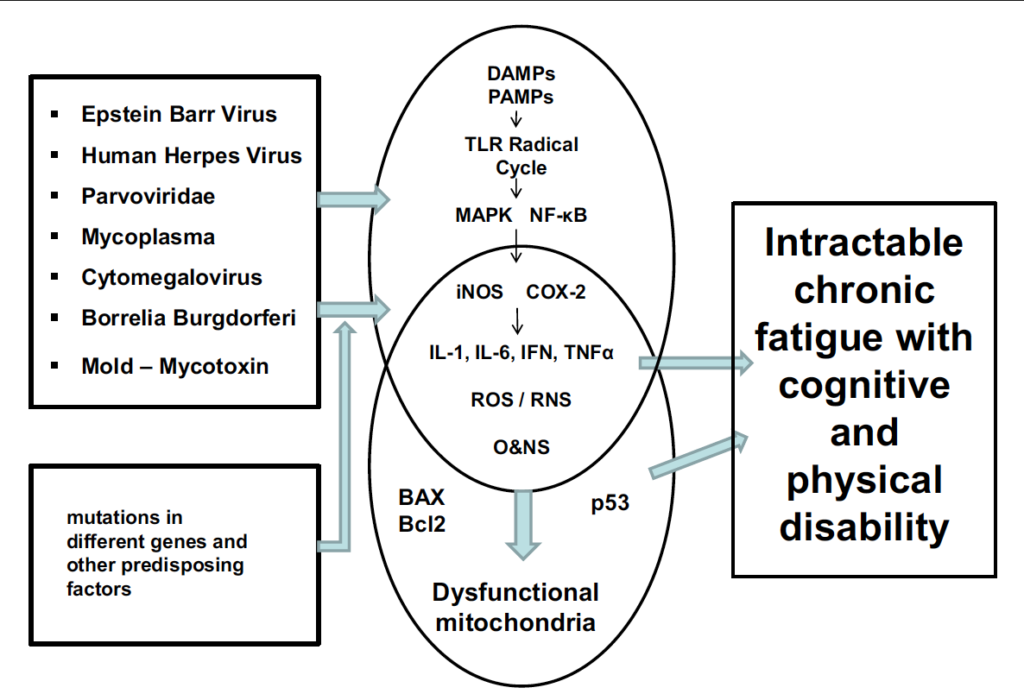Is a Hidden Infection Causing Your Fatigue?
Are you suffering from unrelenting fatigue that doesn't seem to respond to any intervention? Perhaps you've asked your doctor to check your thyroid function and it came back normal. Perhaps you've been testing for iron-deficiency anemia this, too, was normal. Or perhaps you've been told by an integrative medical doctor that your adrenal function is suboptimal. Maybe what you haven't thought of is the fact that you could be harboring hidden pathogens in your body that are robbing your energy and stealing your steam!
If basic testing fails to reveal a cause of your fatigue, you may want to have your doctor test for occult infection. More sophisticated investigations can reveal the presence of all kinds of pathogens capable of colonizing the body and evading the immune system. Some of them include: Parvoviruses, HHV6, Epstein-Barr, Cytomegalovirus, Mycoplasma, and Borrelia burgdorferi. Other patients have a history of chronic fungal infections or biotoxin exposure. A history of chronic mold exposure is a feasible explanation for such symptoms, as is the presence of B. burgdorferi.
Chronic fatigue syndrome is a complicated disorder characterized by extreme fatigue that can't be explained by any underlying medical condition. The fatigue may worsen with physical or mental activity, but doesn't improve with rest.
Chronic fatigue syndrome has eight official signs and symptoms, plus the central symptom that gives the condition its name:
- Fatigue
- Loss of memory or concentration
- Sore throat
- Enlarged lymph nodes in your neck or armpits
- Unexplained muscle pain
- Pain that moves from one joint to another without swelling or redness
- Headache of a new type, pattern or severity
- Unrefreshing sleep
- Extreme exhaustion lasting more than 24 hours after physical or mental exercise
If you see a good medical detective, a physician trained in functional medicine, they can work with you to test for any of these underlying causes of the fatigue,
A study of 375 patients with apparently no cause for their disabling fatigue revealed pathological stimulation of white blood cells with abnormally elevated patterns of natural helper and natural killer cells, important infection fighting agents in the immune system in 53% of patients. It showed depleted levels of IgG subclass three in 59% of the study population. More than 50% had circulating immune complexes and many tested positive for ANA antibodies, usually seen in autoimmune diseases like lupus.

Why is it that some patients who get an infection recover and have no fatigue and others may be colonized with pathogens and suffer from intractable lack of energy?
It appears that part of the answer lies in the genetic polymorphisms or variances in our bodies response to infection and inflammation. For those who develop severe fatigue in response to toxic exposure, like mold or infection, their immune systems respond more robustly to the threat with massive production of cytokines, like IL-ß1 or TNF-alpha.
Moreover, polymorphisms in TNF-alpha,IL-1β, interferons (IFNs), IL-6, and IL-10, acting together or separately can make the severity and response of immune system more profound in response to infection. Why does this happen? Well these pathogens can trigger TLR's (toll-like receptors) by either PAMPs (pathogen-associated molecular patterns) or DAMPs (damage associated molecular patterns). Activation of the TLRs causes a massive cytokine surge that becomes like a domino-effect and keeps on going unrelenting in susceptible individuals, contributing to the inflammation, depression and fatigue. This vicious cycle of pro-inflammatory cytokines that continue to trigger more inflammation and amplify the cycle, leading to more damage and inflammation.
The initial infection followed by chronic inflammation of the immune system could explain the cause of fatigue in these genetically susceptible individuals. Some patients also suffer from cognitive dysfunction, memory loss, or brain fog as well.
What are some common hidden infections that may be causing your fatigue?
- Epstein Barr Virus (EBV)
- Cytomegalovirus (CMV)
- Human Herpes Virus (HHV-6)
- Parvovirus (Parvo B19)
- Mycoplasma sp.
- Borrelia Burgdorferi
- Chronic mold and mycotoxin exposure
Chronic fatigue syndrome is just a label. It's useful to identify a group of symptoms that causes significant fatigue and may affect one's life dramatically causing inability to function or hold a job. It does not represent one clincial entity but the cause may be multi-factorial and different in each individual. It may share a final common pathway of dysfunctional immune activation and inflammation that keeps on going in a self perpetuating manner (like the Energizer Bunny gone bad!) From a functional medicine perspective it's important to get to the root cause of the chronic fatigue symptoms and cognitive impairment. Most of these infections, including the inflammatory response (CIRS) to mold and mycotoxins can be measured by ordering conventional lab testing through a knowledgable practitioner. Ask your doctor to see if he can help you determine the root cause of your fatigue. Treating the root cause (or infection in this case) just might give you back your life!
References:
- The Putative Role of Viruses, Bacteria, and Chronic Fungal Biotoxin Exposure in the Genesis of Intractable Fatigue Accompanied by Cognitive and Physical Disability
- A narrative review on the similarities and dissimilarities between myalgic encephalomyelitis/chronic fatigue syndrome (ME/CFS) and sickness behavior




